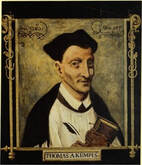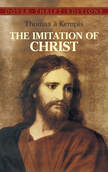|
When Jesus spoke again to the people, he said, “I am the light of the world. Whoever follows me will never walk in darkness, but will have the light of life.” John 8:12 These are the words of Christ; and they teach us how far we must imitate His life and character… The imitation of Christ Bk.1 Ch 1 Thomas von Kempen, Thomas à Kempis, (c. 1380 – 25 July 1471) was a German-Dutch Canon Regular of the Congregation of Windesheim. Thomas (Thomas of/from Kempen) was born in Kempen in the Rhineland, Thomas Hemerken (or Hammerlein), which means "little hammer", after his father’s profession as a blacksmith. Thomas entered the Monastery of Mount St. Agnes, in 1399, as a layman after visiting his brother who was Prior of that monastery at the time. Thomas took Holy Orders in 1413 and was made Sub-Prior of the monastery in 1429. As Sub-Prior he was charged with instructing novices. In that capacity, he wrote four booklets between 1420 and 1427, later collected and named after the title of the first chapter of the first booklet: The Imitation of Christ. Thomas died near Zwolle in 1471. The Imitation of Christ
“He that follows Me shall not walk in darkness,” says the Lord. These are the words of Christ, by which we are reminded that we must copy His life and conduct if we wish to be truly enlightened and to be delivered from all blindness of heart. To meditate on the life of Jesus should therefore be our chief study. Thus begins the great work known, loved, and venerated for six centuries as The Imitation of Christ (De Imitatione Christi), first published in 1418 by the German-Dutch monk and scribe, Thomas Hemerken of Kempen, better known as Thomas à Kempis (1380 – 25 July 1471). “The Imitation” became, and has remained, after the Bible, the most widely read and translated book in the world, and certainly the most influential of Christian devotional writings. Widely praised across centuries and continents, a preface to an 1873 edition of the book reads, “The Imitation of Christ has received the unqualified approbation of every learned and pious ornament of the Church; it is still held in as high estimation by people of every denomination as it was at any time since it came from the pen of Thomas à Kempis.” A century prior, French author Fontenelle described it as, “The most excellent production that ever yet issued from the hand of man.” Indeed, through writing pitched in the highest key of Christian experience, it reveals an exquisite sense of the beauty and wisdom of the Divine will, urging all believers to humbly—and happily—submit with their whole being. While many assume the work to have been intended primarily for monastics and ascetics, its exhortations derive directly from the very bedrock of the Christian life: “If anyone would come after me, he must deny himself and take up his cross and follow me” (Matthew 16:24). Here, then, is the dividing line, the hinge upon which all else in the Christian life swings, and the core principle that informs our vision to amplify this simple and most fundamental aspect of the Gospel message. (From web site of the same name) We begin our four-week book study of The Imitation this Wednesday, January 26th (tomorrow night). You may be receiving this news for the first time, but it is not too late to join the study. I am posting several links below which will give you immediate access to the book, both written and in audio form. On Wednesday night we will determine how many participants have bought the book and which translation they have. There are many translation (as you have read above), but the two most popular are the “Modern Translation” and the translation by William Benham. It was my intention to use the “Modern Translation” for this study, but we will make this determination on Wednesday. In the meantime, I have provided links below for both translations. The first link is for the “Modern Translation.” Below is an excerpt of the "Contents page." This page lists the "Forward" and books one through four as you see in this excerpt: Table of Contents Foreward Book One -- Thoughts Helpful in the Life of the Soul Book Two -- The Interior Life Book Three -- Internal Consolation Book Four -- An Invitation to Holy Communion The page then continues with the contents of Book One, Two, Three, and Four as thus: Book One. Thoughts Helpful in the Life of the Soul 1. Imitating Christ and Despising All Vanities on Earth 2. Having A Humble Opinion of Self 3. The Doctrine of Truth 4. Prudence in Action 5. Reading the Holy Scripture 6. Unbridled Affections 7. Avoiding False Hope and Pride etc. You may use the first set of links to jump to the dedicated "book" page, or you may use the links below to jump straight to the chapter. The BLUE number next to each line is the chapter of the that Book. You will notice the Chapters are several paragraphs or less each. Here is the link: The Imitation of Christ by Thomas a Kempis - Cyber Library (leaderu.com) Next, are the two links below for the translation by William Benham. The first link presents the text in a “chapter format.” This format uses direct jumps to the chapters and a “next” button to advance. I have also placed a second link for this translation which presents the text in a “whole book” format in which the entire book is accessible in scroll form. Link for chapter format: http://literatureproject.com/imitation-christ/index.htm Link for whole book format: https://www.gutenberg.org/cache/epub/1653/pg1653.html In like manner, below are two links, one for the “Modern Translation” and the second for the translation by William Benham. “Modern Translation” link: Thomas à Kempis - The Imitation of Christ (Audiobook) - YouTube William Benham link: https://www.youtube.com/watch?v=nvH3BsXQjmw&t=437s We will focus on several chapters in Book One this Wednesday, however, I suggest that you read or listen to all of Book One. For this Wednesday please read and listen to: Book One Ch's. 1 through 9 Ch's. 11, 12, 14, 20, 23 We will focus on the theme of "Helpful Counsels of the Spiritual Life," as Thomas states in the opening. You are encouraged to take notes or highlight places of interest as you read/listen. We will be looking at key aspects of these chapters in our study time. However, if you have reflections or comments found in other chapters, we will try to address them all. Peace in Christ, Fr. Bill+
0 Comments
Leave a Reply. |
AuthorFather Bill Burk† Archives
July 2024
Categories |
Proudly powered by Weebly



 RSS Feed
RSS Feed